Article
14 Best Automated Deployment Tools in 2025
Explore the best automated deployment tools to streamline your DevOps workflow, boost efficiency, reduce errors & accelerate your software delivery pipeline.

[Updated November 2025]
In an era defined by the rapid evolution of technology, the ability to efficiently and consistently deploy software is the linchpin of success for businesses worldwide. Welcome to our exploration of the 14 best automated deployment tools of 2025, where we embark on a journey to demystify the world of deployment automation.
Picture a scenario where deploying software to various environments, from development to production, happens seamlessly and without hiccups. This is the promise that automated deployment tools hold, a promise of increased productivity, fewer errors, and a faster time-to-market for your applications.
In this guide, we'll not only introduce you to the leading deployment automation solutions but also delve into the fundamental "why" behind automating deployments. We'll examine the key features, benefits, drawbacks, and pricing considerations for each tool, arming you with the insights you need to make informed decisions.
So, whether you're a seasoned DevOps engineer, a developer looking to streamline your workflow, or simply someone curious about the future of software deployment, join us on this journey as we explore the cutting-edge world of automated deployment tools in 2025.
Why automate deployments?
In modern software development, implementing automated database deployment tools is paramount. These tools, such as continuous integration and continuous delivery (CI/CD) pipelines, streamline releasing and managing database changes, ensuring a more efficient and reliable deployment workflow. They have become essential for more agile and error-free software deployment processes.
Comparison Table
Automated Deployment Tools: Overview
1. Functionize

Functionize is a next-gen AI testing platform built for modern CI/CD. It uses machine learning, big data, and computer vision to automate complex workflows. At its core are self-healing AI agents that adapt in real time to application changes. No brittle scripts. No constant maintenance.
These agents use multi-modal AI to map app behavior and learn from similar platforms. Tests stay stable—even as the UI evolves. This means faster feedback, fewer failures, and more reliable releases. QA becomes a strategic advantage, not a bottleneck.
Functionize also supports low-code test creation. Both technical and non-technical users can build and manage tests easily. Its cloud-native setup runs thousands of tests in parallel. Test cycles shrink. Delivery speeds up.
Real-time reporting and smart analytics offer full visibility into performance. Teams catch issues early and deploy with confidence. Functionize grows with the business, whether scaling automation or modernizing QA.
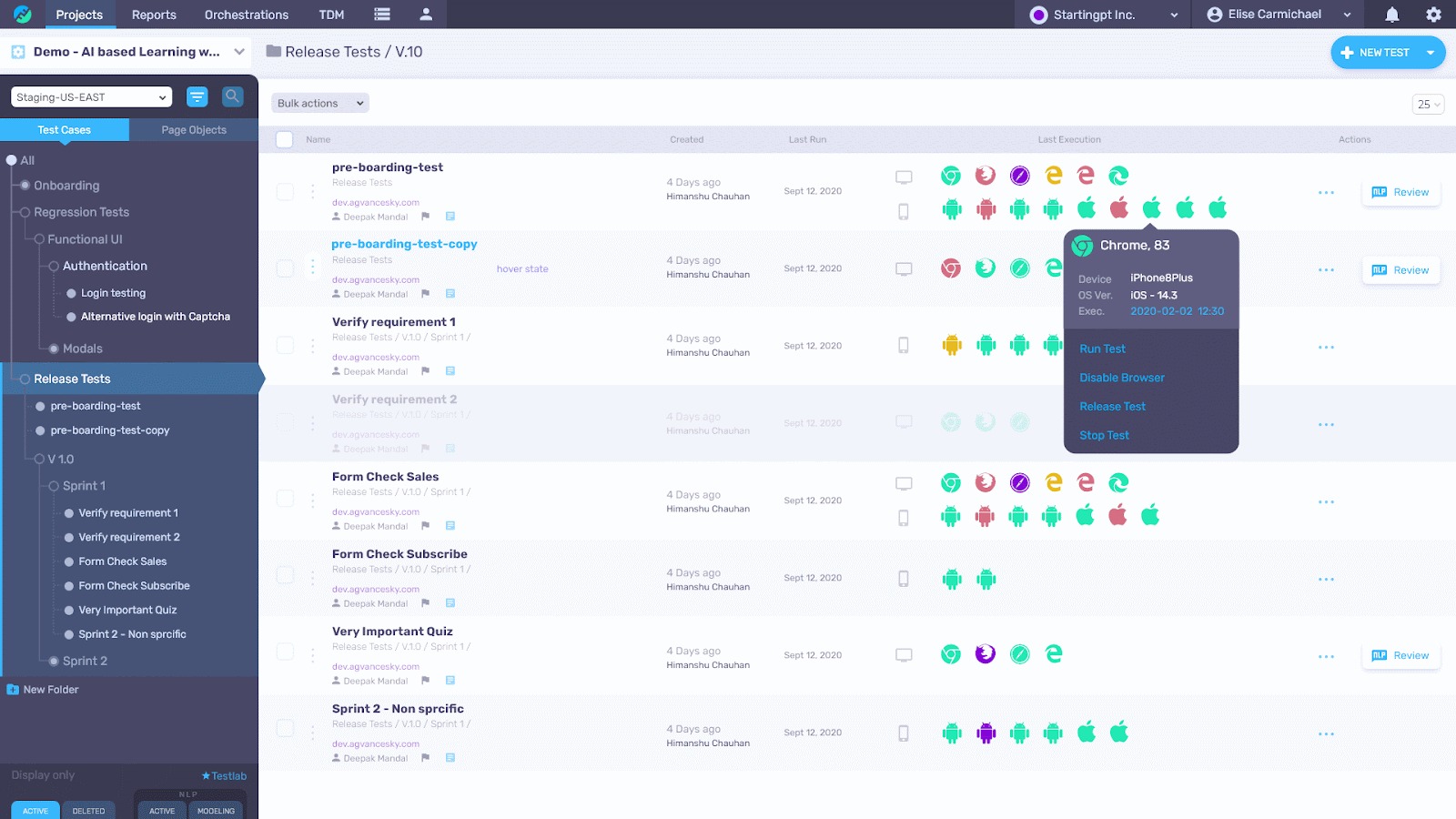
Benefits and Features
- AI at scale: Industry-leading ML powers fast, stable testing across complex workflows.
- Self-healing tests: Tests update automatically when your UI changes.
- Cloud-native execution: Run thousands of tests in parallel. Get fast feedback.
- Low-code interface: Anyone can build tests. No deep coding skills needed.
- Full test coverage: Catch issues early with end-to-end application testing.
- Stable and smart: Fewer flaky tests. Automation learns how your app behaves.
- CI/CD ready: Fits seamlessly into your existing pipeline.
- EAI agents: Autonomous agents adapt to your team and boost output.
- Top-tier support: Expert help at every stage of your automation journey.
- Faster releases, less test debt: Ship quicker. Maintain less. Focus on innovation.
Customer ratings:
Capterra reviews:/ ,Capterra rating:/
Features Valued by Users on Capterra or G2
- CI/CD Integration: Seamlessly connects with tools like Jenkins and GitLab for automated testing in deployment pipelines.
- API Integration: Supports API-driven test automation, enhancing deployment validation.
- Real-Time Monitoring: Provides live test results and deployment validation dashboards.
- Parallel Test Execution: Runs multiple tests concurrently to speed up deployment validation.
- Alerts/Notification Systems: Sends alerts for test failures or deployment issues via Slack or email.
- Parameterized Testing: Allows customizable test scripts for varied deployment scenarios.
- Test Management: Centralizes test case management for deployment quality assurance.
- Data Visualization: Offers visual reports for test coverage and deployment health.
- Requirements-Based Testing: Aligns tests with deployment requirements to ensure compliance.
2. Jenkins

Jenkins is a popular open-source continuous integration and continuous delivery (CI/CD) platform. Written in Java, it runs on any system with the Java Runtime Environment. Development teams use Jenkins to streamline releases and reduce manual work. It supports version control systems like GitHub, GitLab, and Bitbucket. Build tools such as Maven and Gradle integrate seamlessly.
Jenkins triggers automated pipelines based on code changes. This ensures quick feedback and early bug detection. It also supports container tools like Docker and Kubernetes, enabling more flexible testing and deployment.
With its vast plugin library, Jenkins adapts to many use cases. QA teams use it to manage automated testing across multiple environments. It supports parallel execution and multi-configuration projects.
Organizations rely on Jenkins to scale DevOps practices efficiently. It’s highly customizable, easy to extend, and built for automation at every step of the delivery pipeline.
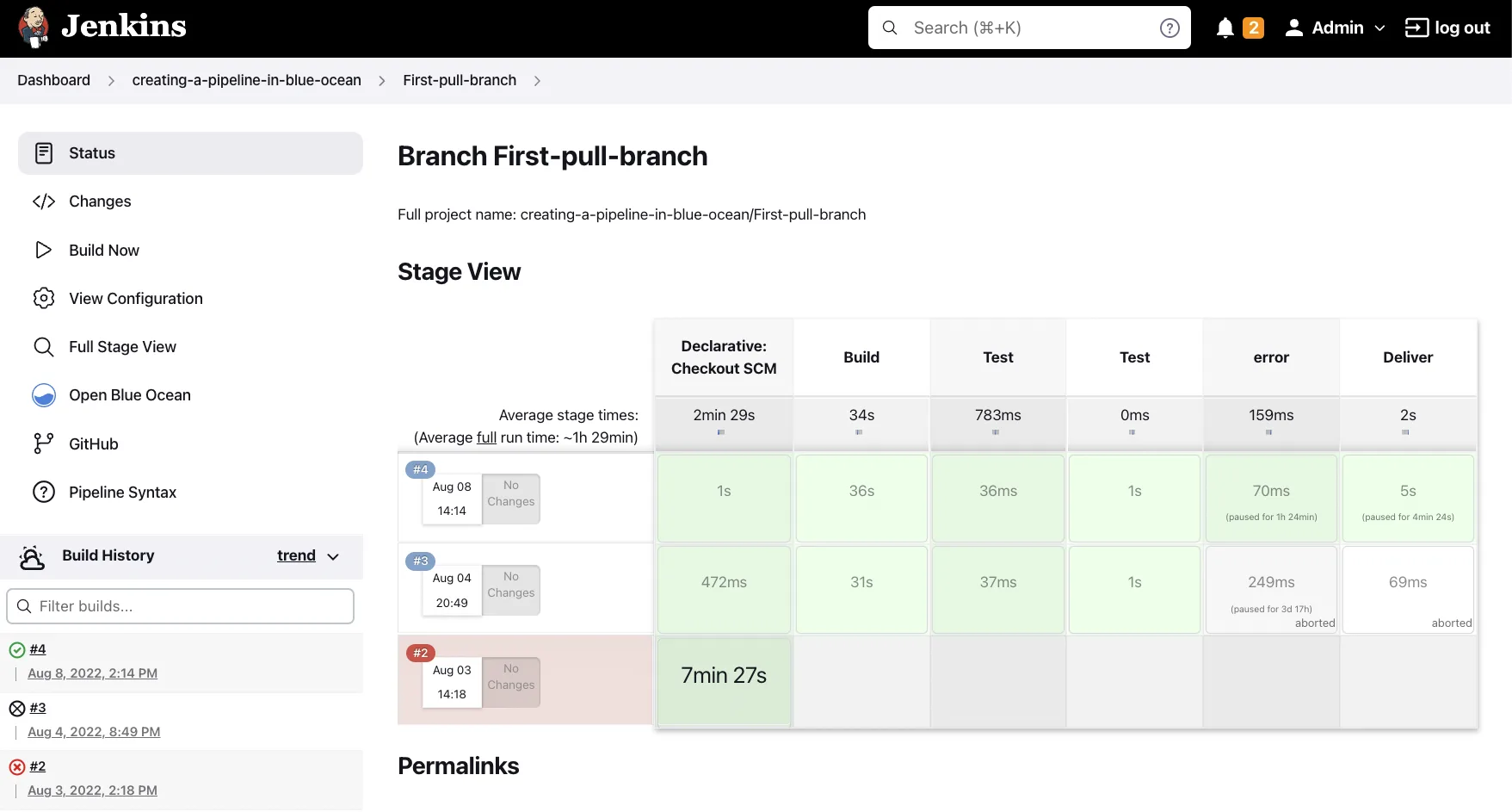
Benefits and Features
- Open source and free to use
- Highly customizable
- Can be integrated with a wide range of other tools
- Supports a wide range of programming languages and deployment platforms
- Offers a variety of features to help you automate your deployment process, including build pipelines, deployment templates, and approvals
Drawbacks
- Complexity: Jenkins can be complex to set up and configure. New users may struggle with its many options and plugins.
- Technical Knowledge: Requires knowledge of Java and scripting languages. Teams without this expertise may face challenges.
- User Interface: The user interface is outdated and not very intuitive, making navigation and setup harder for beginners.
- Learning Curve: Jenkins has a steep learning curve, and it may take time for users to become comfortable with its features.
- Plugin Management: Managing plugins can be tricky, with frequent updates and compatibility issues disrupting workflows.
- Resource Heavy: For small teams with limited resources, Jenkins may be too resource-heavy. It requires ongoing maintenance, which could be a burden for smaller setups.
Pricing
Free and Open Source
Customer ratings:
G2 reviews: 523, G2 rating: 4.4
Capterra reviews: 562, Capterra rating: 4.5
Features Valued by Users on Capterra or G2
- Pipeline Automation: Supports customizable build and deployment pipelines via Jenkinsfile.
- Multi-Environment Deployment: Deploys to cloud, on-premises, or containerized environments.
- Plugin Ecosystem: Offers 1,800+ plugins for integrations with Git, Docker, and AWS.
- Parallel Pipeline Execution: Runs multiple build/deployment jobs concurrently.
- Alerts/Notification Systems: Notifies teams of build/deployment status via email or Slack.
- Configuration Management: Manages deployment configurations through code.
- Real-Time Monitoring: Provides live build and deployment progress tracking.
- Scalability: Scales from small projects to enterprise-level deployments.
- Integration Capabilities: Connects with GitHub, Kubernetes, and other DevOps tools.
3. TeamCity

TeamCity is a commercial CI/CD platform from JetBrains, designed for medium to large organizations. It automates the process of building, testing, and deploying code. This makes the software development lifecycle more efficient. TeamCity has an intuitive interface and integrates well with version control systems like Git, SVN, and Mercurial. It supports many programming languages, such as Java, .NET, and Python.
TeamCity offers powerful features beyond basic testing. It provides code coverage analysis and can detect flaky tests—those that produce inconsistent results. The platform can also prioritize test execution based on risk. This helps ensure more reliable and accurate test results.
With its comprehensive capabilities, TeamCity is ideal for teams that face complex development and deployment challenges. It helps improve test reliability and speeds up the development process.
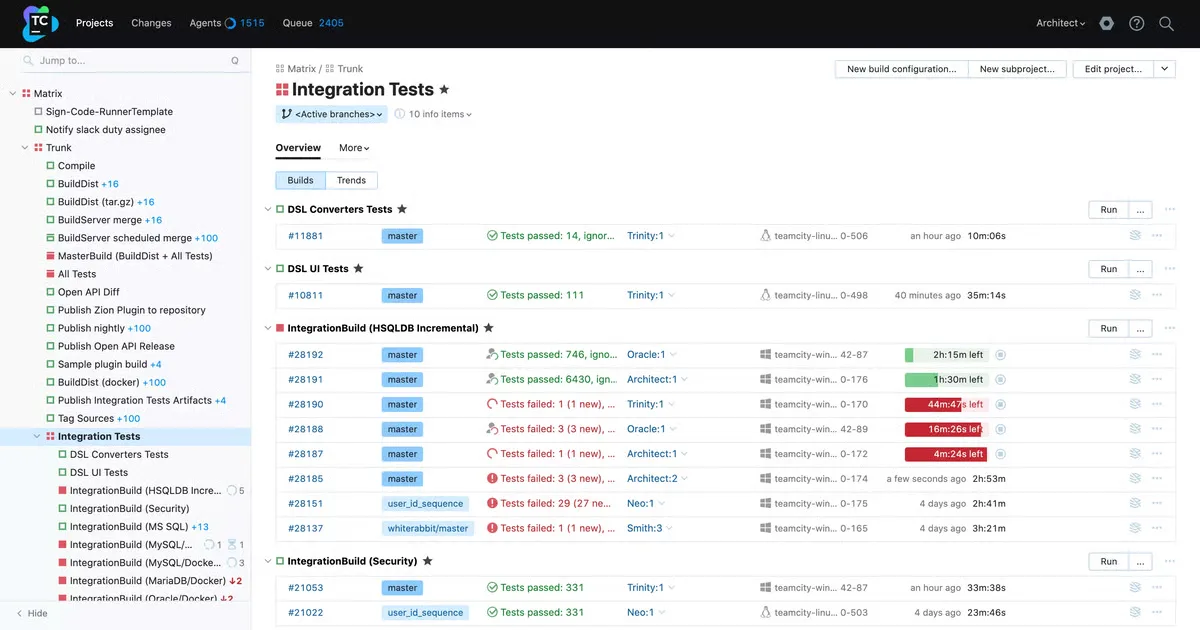
Benefits and Features
- Powerful and feature-rich CI/CD platform
- Supports a wide range of programming languages and deployment platforms
- Offers a variety of features to help you automate your deployment process, including build pipelines, deployment templates, and approvals
- Provides detailed reports and analytics
- Offers enterprise-grade support
Drawbacks
- Complex Setup: Setting up and configuring TeamCity can be difficult. It often requires a lot of time and attention to detail.
- Learning Curve: The platform can be hard to master, especially for beginners. It takes time to become proficient, which can be frustrating.
- Confusing UI: The user interface can be difficult to navigate. It may be unclear where to find certain features or what certain links lead to.
- Cluttered Admin Panel: The admin panel is often described as cluttered. It’s not always intuitive, making it hard to manage tasks.
- Requires Support: If a team lacks support, it can be challenging to troubleshoot issues. Teams may struggle without a clear understanding of the platform’s features.
Pricing
Cloud version starting at $45 per month
Customer ratings:
G2 reviews: 85, G2 rating: 4.3
Capterra reviews: 49, Capterra rating: 4.6
Features Valued by Users on Capterra or G2
- Build Pipelines: Offers flexible, reusable pipeline templates for automated deployments.
- Parallel Pipeline Execution: Executes multiple build/deployment tasks simultaneously.
- Integration Capabilities: Integrates with Git, Docker, and Octopus Deploy.
- Real-Time Monitoring: Displays live build and deployment status.
- Alerts/Notification Systems: Sends notifications for pipeline events via email or chat tools.
- Configuration Management: Simplifies environment setup with reusable configurations.
- Scalability: Supports medium to large organizations with complex needs.
- User-Friendly Interface: Praised for intuitive UI and easy pipeline setup.
- Deployment Approvals: Enables manual approval gates for controlled releases.
4. AWS CodeDeploy

AWS CodeDeploy is a managed CI/CD service from Amazon Web Services (AWS). It is a good choice for organizations already using AWS for their infrastructure and applications. AWS CodeDeploy can be used to automate the deployment of applications to various AWS services, including Amazon Elastic Compute Cloud (EC2), Amazon Elastic Beanstalk, and Amazon ECS.
CodeDeploy handles deployment tasks that are usually manual and error-prone. It reduces the risk of mistakes and downtime. It lets teams push updates faster and more safely. Changes can be introduced gradually to limit disruption. If issues are found, deployments can be rolled back quickly.
The service works with many types of applications and stacks. It supports common languages and platforms. Teams can control deployments through the AWS Console or CLI. Status updates and deployment logs are available in real time.
CodeDeploy integrates well with other AWS tools like CodePipeline. It also connects with external tools like GitHub and Jenkins. This makes it easy to fit into existing DevOps workflows.
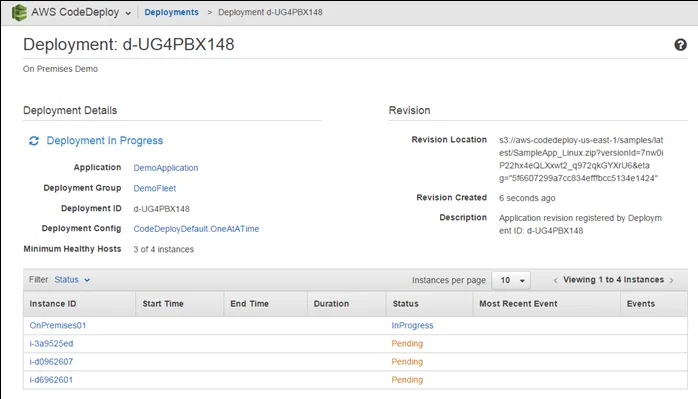
Benefits and Features
- Managed CI/CD service from AWS
- Easy to set up and use
- Supports a variety of AWS services
- Offers a variety of deployment options
- Provides detailed reports and analytics
Drawbacks
- AWS-Only Focus: Works best with AWS services. Limited support for other cloud providers.
- Not Ideal for Multi-Cloud: May not fit well in multi-cloud or hybrid cloud environments.
- Learning Curve: Can be hard for beginners. New users need time to understand AWS concepts.
- Complex Setup: Initial setup can take time. Configuration may be confusing without prior AWS experience.
- Limited Customization: Offers fewer customization options compared to manual pipelines or other tools.
- Basic Reporting: Lacks some advanced reporting features seen in other CI/CD platforms.
- Harder for Small Teams: Smaller teams may find it too complex for simple deployment needs.
Pricing
Custom pricing available on their website - https://aws.amazon.com/codedeploy/pricing/
Customer ratings:
G2 reviews: 65, G2 rating: 4.2
Capterra reviews: 5, Capterra rating: 4.2
Features Valued by Users on Capterra or G2
- Multi-Environment Deployment: Deploys to AWS EC2, Lambda, or on-premises servers.
- Automated Rollbacks: Reverts failed deployments to maintain stability.
- Real-Time Monitoring: Tracks deployment health and instance status.
- Integration Capabilities: Works with AWS CodePipeline, CodeBuild, and Git.
- Scalability: Handles large-scale deployments across AWS infrastructure.
- Deployment Strategies: Supports blue-green and rolling updates.
- Alerts/Notification Systems: Notifies teams of deployment success/failure.
- Configuration Management: Manages deployment configurations via AWS console.
- Parallel Deployment Execution: Deploys to multiple instances concurrently.
5. Azure DevOps

Azure DevOps is Microsoft’s cloud-based platform for managing the full software development lifecycle. It offers a complete set of tools to plan, build, test, and deploy applications. It supports both cloud and on-premises projects and helps teams streamline workflows from start to finish.
The platform includes services for source control, continuous integration, delivery pipelines, and testing. It integrates easily with other Microsoft tools, GitHub, and third-party services, making it flexible for various team setups. Developers, testers, analysts, and project managers can all collaborate in one environment.
Azure DevOps also includes Azure Test Plans, a browser-based testing tool. It supports manual, exploratory, and user acceptance testing, with features for collecting feedback and tracking test outcomes. With its scalable setup and broad integration options, Azure DevOps is well-suited for teams looking to adopt or enhance DevOps practices across their organization.
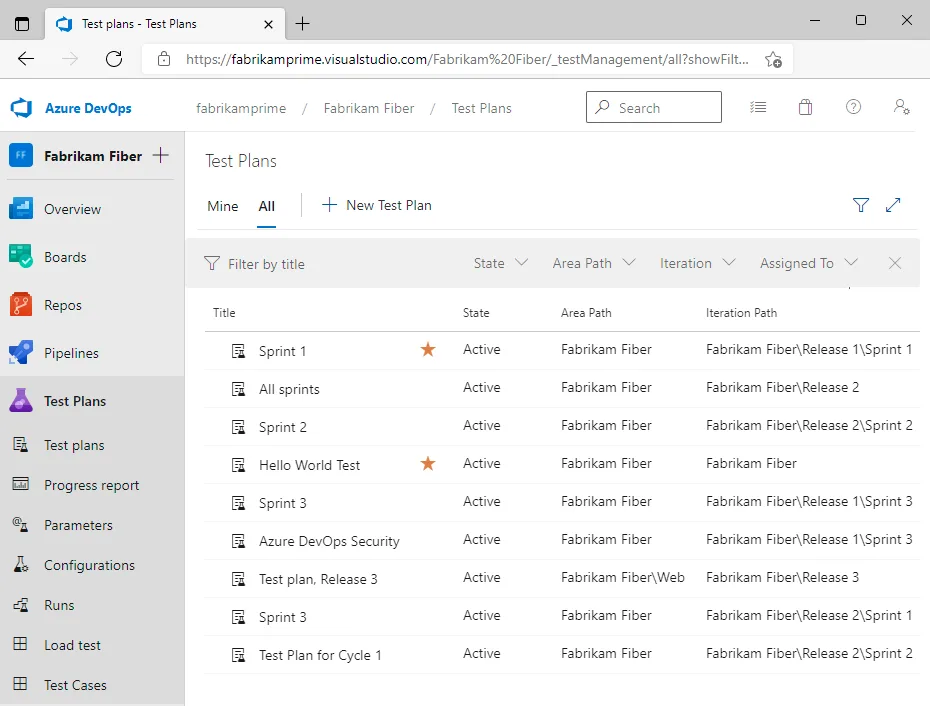
Benefits and Features
- Dashboard Control: Offers customizable dashboards for clear visibility into project status and quick navigation across tools.
- Source Control Flexibility: Supports Git and TFVC for seamless version control, code reviews, and branch management.
- Agile Work Planning: Enables backlog tracking, sprint planning, and Kanban boards to support Scrum, Kanban, or hybrid workflows.
- Rapid Deployment: Speeds up software delivery with streamlined CI/CD pipelines for automated builds, tests, and releases.
- Built-in Testing: Provides tools for manual and exploratory testing with traceability, workflow customization, and real-time insights.
- Team Collaboration: Enhances teamwork with wikis, work item discussions, feedback loops, and Power BI-based reporting.
Drawbacks
- Steep Learning Curve: The interface can feel overwhelming for new users, especially when configuring pipelines or workflows.
- Complex Setup: Initial setup, including agent configuration and role management, is more complicated than expected.
- Interface Limitations: Navigation and UI design are not as intuitive, making it harder to find and use key features.
- Access Management: Assigning permissions and managing roles across teams requires extra effort and clarity.
- Higher Cost: Pricing is relatively high compared to other DevOps tools, especially for smaller teams or budget-conscious projects.
Pricing
Custom pricing available on their website: https://azure.microsoft.com/en-us/pricing/details/devops/server/
Customer ratings:
G2 reviews: 584, G2 rating: 4.3
Capterra reviews: 145, Capterra rating: 4.4
Features Valued by Users on Capterra or G2
- CI/CD Pipelines: Automates build, test, and deployment with customizable pipelines.
- Multi-Cloud Deployment: Supports Azure, AWS, and GCP deployments.
- Integration Capabilities: Connects with GitHub, Docker, and Kubernetes.
- Real-Time Monitoring: Provides dashboards for pipeline and deployment status.
- Alerts/Notification Systems: Sends alerts for pipeline failures or deployment issues.
- Scalability: Scales from small teams to enterprise-level projects.
- User-Friendly Interface: Praised for intuitive pipeline designer and UI.
- Deployment Approvals: Supports manual and automated approval workflows.
- Parallel Pipeline Execution: Runs multiple deployment tasks simultaneously.
6. Ansible

Ansible is a powerful configuration management and automation tool. QAs use it to automate the deployment of applications to any type of infrastructure, including physical servers, virtual machines, and cloud servers. Ansible is agentless, meaning it doesn't require any additional software to be installed on the target machines, making it lightweight and easy to maintain.
It supports a wide range of automation tasks—from software provisioning and updates to orchestrating complex workflows. Ansible plays a key role in the “infrastructure as code” approach, allowing teams to define infrastructure configurations in simple, human-readable scripts. This improves transparency, version control, and consistency.
Because it uses YAML-based playbooks, it’s accessible even to those without deep programming knowledge. Ansible’s scalability also makes it ideal for managing large infrastructures efficiently.

Benefits and Features
- Open source and free to use
- Powerful and flexible configuration management and automation tool
- Supports a wide range of operating systems and platforms
- Offers a variety of features to help you automate your deployment process, including playbooks, roles, and variables
Drawbacks
- YAML Sensitivity: YAML’s strict indentation rules make scripts prone to small formatting errors that can break functionality.
- Complex Setup: Initial setup, including environment configuration and organizing larger automation tasks, can be more complicated than expected.
- Performance Limitations: Ansible executes tasks sequentially, which can slow down performance in large-scale environments lacking parallel processing.
- Playbook Maintenance: As automation grows, playbooks become harder to read, manage, and troubleshoot—especially with limited documentation.
- Error Handling Limitations: Built-in error handling is basic and can make diagnosing failures in complex playbooks more difficult.
- Scheduling Constraints: Ansible’s native scheduling and orchestration features are limited, requiring integration with other tools like Jenkins or Rundeck for more advanced workflows.
Pricing
Free and open source
Customer ratings:
G2 reviews: 309, G2 rating: 4.6
Capterra reviews: 9, Capterra rating: 4.6
Features Valued by Users on Capterra or G2
- Infrastructure as Code (IaC): Defines deployments using YAML playbooks.
- Multi-Environment Deployment: Automates deployments across cloud and on-premises.
- Integration Capabilities: Works with Jenkins, AWS, and Kubernetes.
- Scalability: Manages large-scale infrastructure with ease.
- User-Friendly Interface: Simplifies automation with readable YAML syntax.
- Real-Time Monitoring: Tracks playbook execution and system status.
- Alerts/Notification Systems: Notifies users of automation failures.
- Parallel Task Execution: Runs multiple automation tasks concurrently.
- Configuration Management: Ensures consistent environment setups.
7. Octopus Deploy

Octopus Deploy is a commercial CI/CD platform designed for enterprise organizations. It offers a wide range of features to help you automate your deployment process, including build pipelines, deployment templates, and approvals.
Configuration settings are stored separately for each environment. Variables, credentials, and API keys are reused across projects. Octopus Deploy supports role-based access control to manage user permissions. Teams can standardize deployment steps and share them across projects. It provides logs and deployment history to support tracking and troubleshooting.
Octopus integrates with tools like GitHub, Jenkins, Azure DevOps, and Bitbucket. It handles application deployments, database changes, and infrastructure updates.
The platform helps reduce manual tasks and keeps deployment consistent. Everything is managed in a single place, without the need for custom scripts.
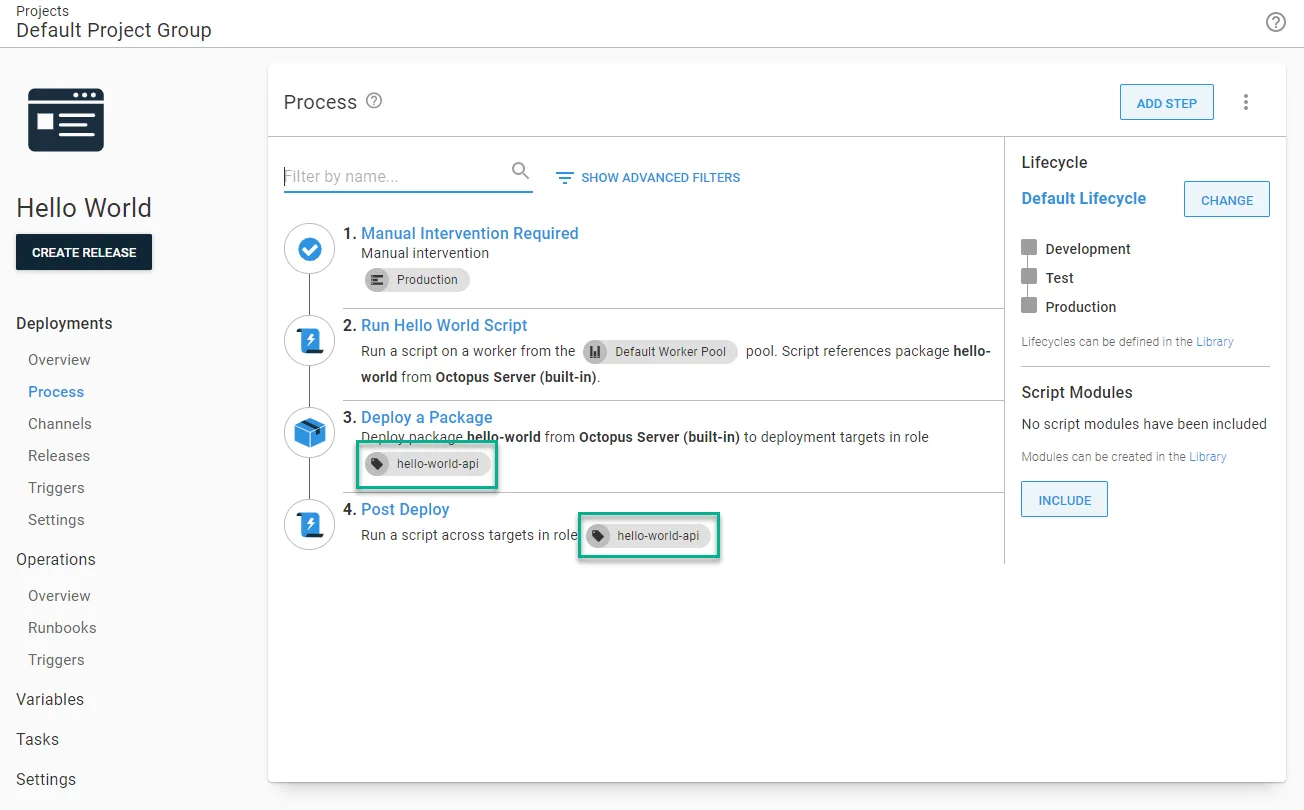
Benefits and Features
- Comprehensive set of features for automating the deployment process
- Easy to use and manage
- Flexible and scalable
- Integrates with a wide range of other tools
- Offers enterprise-grade support
Drawbacks
- Paid Subscription Required: Octopus Deploy requires a paid license.
- Complex Setup: The platform can be difficult to configure initially, especially when managing multiple environments and roles.
- Not Ideal for Small Teams: Smaller teams may find it too complex or expensive for their limited deployment needs.
- Runbook Issues: Runbooks occasionally hang or fail, requiring manual intervention like agent reboots.
- Slow Deployments: Some users report that deployments take longer than expected, slowing down the release process.
- Limited Support: Customer support responses can be slow or insufficient, making troubleshooting more difficult.
Pricing
Starting at $10 flat fee per month
Customer ratings:
G2 reviews: 52, G2 rating: 4.4
Capterra reviews: 60, Capterra rating: 4.8
Features Valued by Users on Capterra or G2
- Deployment Pipelines: Streamlines release management with reusable templates.
- Multi-Environment Deployment: Deploys to cloud, hybrid, and on-premises.
- Integration Capabilities: Integrates with Jenkins, TeamCity, and Git.
- Real-Time Dashboards: Monitors deployment progress in real time.
- Alerts/Notification Systems: Sends Slack/email alerts for deployment events.
- Scalability: Supports enterprise-scale deployments with multi-tenancy.
- Security Controls: Offers encryption and access controls for secure deployments.
- Parallel Deployment Execution: Deploys to multiple targets simultaneously.
- Rollback Support: Enables easy reversion of failed deployments.
8. Bamboo

Bamboo is a commercial CI/CD platform from Atlassian. It is a good choice for teams of all sizes. Bamboo offers a variety of features to help you automate your deployment process, including build pipelines, deployment templates, and approvals.
When code is committed, Bamboo automatically builds, tests, and deploys the application. It uses a structured workflow based on Plans, Stages, Jobs, and Tasks, making it easy to manage complex processes. It integrates well with other Atlassian tools like Jira and Bitbucket. Developers can track build status and deployment progress directly. Bamboo also supports parallel testing, which speeds up feedback cycles. It allows configuration of deployment environments and approval steps. Notifications help teams stay updated on build results. As a paid product, Bamboo offers additional enterprise features and dedicated support. It is a practical option for teams looking for integrated CI/CD workflows within the Atlassian ecosystem.
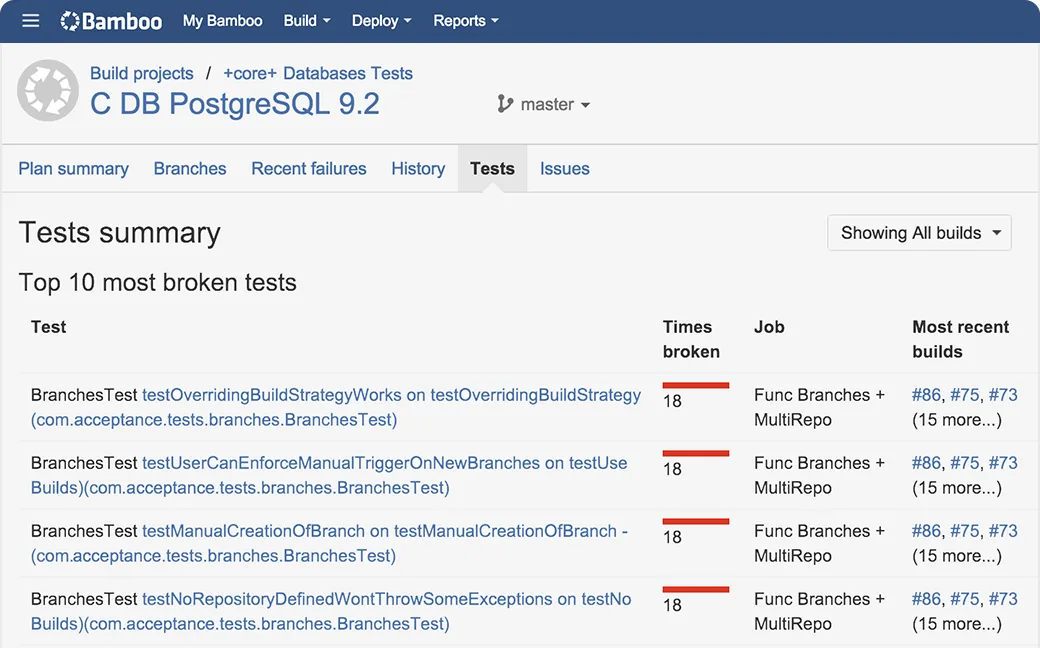
Benefits and Features
- Supports a wide range of programming languages and deployment platforms
- Offers a variety of features to help you automate your deployment process, including build pipelines, deployment templates, and approvals
- Provides detailed reports and analytics
- Offers enterprise-grade support
Drawbacks
- Paid Subscription Required: Bamboo is a commercial product, so teams must pay for access and ongoing use.
- Complex Setup: Initial setup and configuration can be difficult, especially for teams without prior experience.
- Not Ideal for Small Teams: Smaller teams with limited time or budget may find Bamboo too resource-intensive.
- Slow Performance: The platform sometimes experiences delays, especially when loading data or accessing the UI.
- Not User-Friendly: Some users find the interface unintuitive and harder to navigate compared to other CI/CD tools.
- Lacks Visual Appeal: The UI is basic and does not offer modern or visually engaging design elements.
- Steeper Learning Curve: Compared to tools like GitLab, Bamboo may take more time to learn and operate efficiently.
Pricing
Data center with 1 remote agent starts ar $1200
Customer ratings:
G2 reviews: 64, G2 rating: 4.1
Capterra reviews: 15, Capterra rating: 4.5
Features Valued by Users on Capterra or G2
- Build Pipelines: Automates build, test, and deployment with reusable plans.
- Integration Capabilities: Connects with Jira, Bitbucket, and Docker.
- Multi-Environment Deployment: Supports cloud and on-premises deployments.
- Real-Time Monitoring: Tracks build and deployment status in real time.
- Alerts/Notification Systems: Notifies teams via email or Atlassian tools.
- Scalability: Scales for teams of all sizes, from small to enterprise.
- User-Friendly Interface: Praised for intuitive pipeline configuration.
- Parallel Build Execution: Runs multiple build/deployment tasks concurrently.
- Deployment Approvals: Supports manual approvals for controlled releases.
9. CircleCI

CircleCI is a commercial CI/CD platform designed for cloud-native applications. It is a good choice for teams of all sizes. CircleCI offers a variety of features to help you automate your deployment process, including build pipelines, deployment templates, and approvals.
It supports custom workflows, parallel job execution, and matrix builds. Teams can use caching, Docker layer caching, and resource classes to speed up complex pipelines. CircleCI integrates with many tools and services across the development lifecycle. Developers receive real-time feedback through email or chat notifications on job success or failure. It supports Linux, macOS, and Windows environments.
CircleCI is highly configurable with simple YAML-based configuration files. It also includes tools for test splitting, automatic retry, and secure secret management. The platform helps reduce manual steps in deployment workflows.
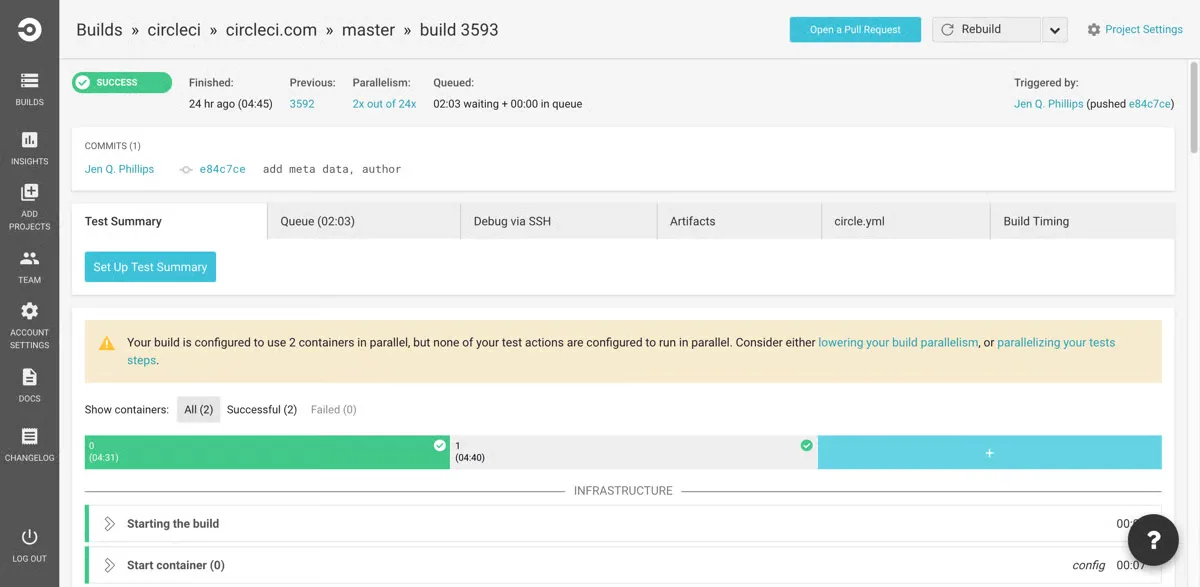
Benefits and Features
- Supports a wide range of programming languages and deployment platforms
- Offers a variety of features to help you automate your deployment process, including build pipelines, deployment templates, and approvals
- Provides detailed reports and analytics
- Offers enterprise-grade support
Drawbacks
- Complex Configuration: Setting up and managing advanced pipelines can be difficult, especially for beginners.
- Not Ideal for Small Teams: The cost and complexity may be too high for small teams with limited technical resources.
- Confusing Pricing Structure: The pricing page and billing details are not easy to understand, especially for infrequent users.
- Lack of Usage Transparency: It's hard to track how build minutes or credits are used, making cost management difficult.
- Unclear Build Metrics: Reported compute minutes can differ significantly from actual build time, causing confusion.
- Limited Billing Support: The platform does not provide consolidated billing or clear usage breakdowns when requested.
Pricing
Free and paid plans. Paid plans start at $15 per month
Customer ratings:
G2 reviews: 503, G2 rating: 4.4
Capterra reviews: 92, Capterra rating: 4.6
Features Valued by Users on Capterra or G2
- Pipeline Control: Gives teams control over how and when pipelines run, including approval steps and conditional logic.
- Extensible Workflows: Supports custom scripts and plugins, making it easy to adapt pipelines to unique team needs.
- Staging Environment Support: Enables deployment to staging environments for testing before going live.
- Flexible Test Configuration: Allows users to customize how tests run based on code changes or environment conditions.
- Integration with Developer Tools: Works well with popular tools like GitHub, Bitbucket, AWS, Docker, and Slack.
- Automation of Repetitive Tasks: Automates build, test, and deployment tasks to reduce manual work.
- Process Visibility: Provides clear tracking of each step in the CI/CD pipeline for easier troubleshooting.
- Built-in Reporting: Offers insights into build performance, failures, and test coverage.
- Multi-Project Support: Manages workflows across multiple repositories or services within the same interface.
- Scalable Infrastructure: Handles workloads from small projects to complex enterprise deployments.
10. GitLab CI/CD

GitLab CI is a built-in CI/CD pipeline that is part of the GitLab code hosting platform. It allows development teams to automate their build, test, and deployment processes directly within their GitLab environment. This tight integration makes it a strong option for teams already managing their source code with GitLab.
Developers can define pipelines using .gitlab-ci.yml files, making version control and updates simple. GitLab CI supports a wide range of deployment targets, from cloud services to on-premises environments. It helps teams catch errors early in the development lifecycle by running tests automatically on code commits and merges.
GitLab CI also supports parallel execution, containerization with Docker, and secure environment variables. Built-in monitoring and compliance features make it easier to track performance and enforce coding standards. Teams benefit from centralized pipeline management, audit logs, and permission controls.
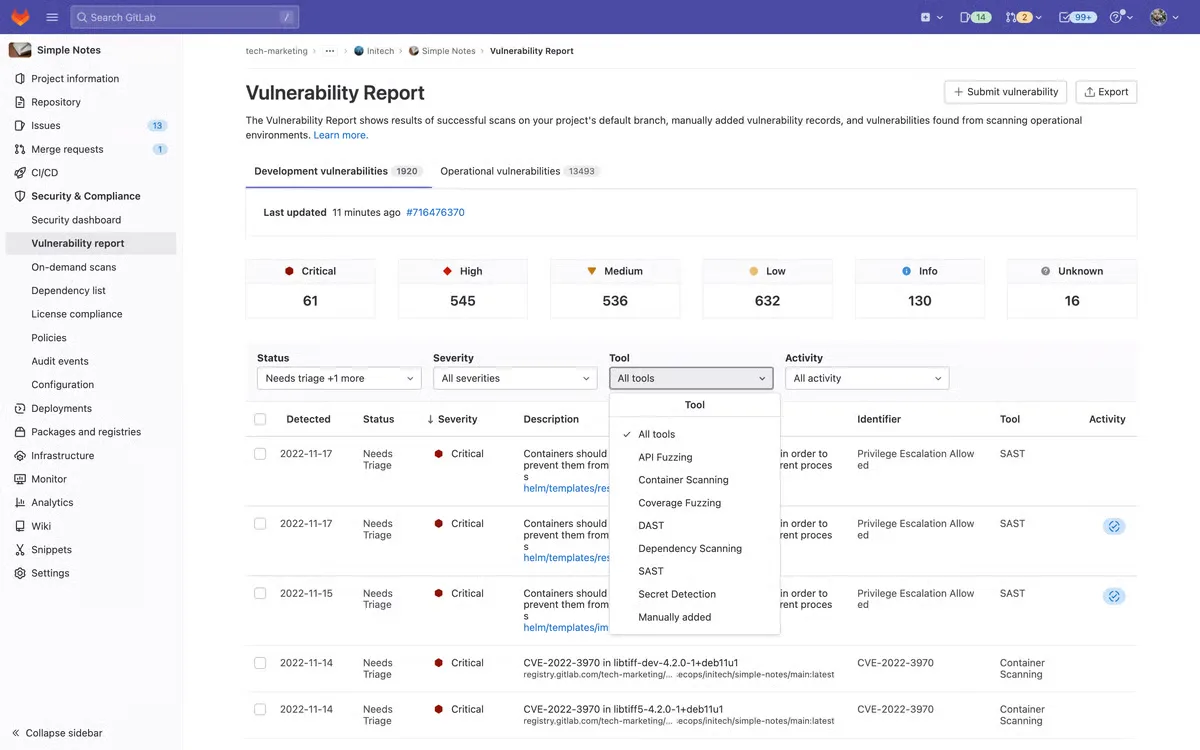
Benefits and Features
- Built-in CI/CD pipeline that is part of the GitLab code hosting platform
- Easy to use and set up
- Supports a wide range of programming languages and deployment platforms
- Offers a variety of features to help you automate your deployment process, including build pipelines, deployment templates, and approvals
Drawbacks
- GitLab Dependency: Only works if the team is using GitLab for code hosting.
- Limited Reporting: Custom report generation is limited compared to tools like Jira.
- Missing Features: Lacks some advanced features found in other CI/CD platforms.
- Complex Configuration: Setting up default runners requires specific command-line actions.
- Merge Conflict Handling: Some commands, like managing merge conflicts, can be error-prone.
- Public Repository Access: Does not offer easy access to certain public repositories.
- Cluttered Interface: The user interface can feel overwhelming for beginners.
- Premium Cost: Some useful features are only available under expensive premium plans.
- Integration Errors: Occasional errors occur during integration with third-party tools.
- Steep Learning Curve: Initial setup and usage may be challenging without prior experience.
Pricing
Paid and free plans
Customer ratings:
G2 reviews: 823, G2 rating: 4.5
Capterra reviews: 1190, Capterra rating: 4.6
Features Valued by Users on Capterra or G2
- CI/CD Pipelines: Automates build, test, and deployment with .gitlab-ci.yml files.
- Multi-Environment Deployment: Deploys to cloud, Kubernetes, or on-premises.
- Integration Capabilities: Native support for GitLab repositories, Docker, and Kubernetes.
- Real-Time Monitoring: Tracks pipeline and deployment status in real time.
- Alerts/Notification Systems: Notifies teams via email or chat integrations.
- Scalability: Scales from small teams to enterprise DevOps.
- User-Friendly Interface: Simplifies pipeline setup with YAML-based configuration.
- Parallel Pipeline Execution: Runs multiple jobs concurrently for faster deployments.
- Deployment Approvals: Supports manual approval stages for releases.
11. GitHub Actions

GitHub Actions is a built-in CI/CD tool that comes with the GitHub platform. It helps teams automate tasks like building, testing, and deploying code. Since it's integrated into GitHub, it's a natural fit for teams already using the platform for code hosting. GitHub Actions lets users create workflows using YAML files. These workflows can be triggered by various events like push, pull request, issue creation, or even a schedule.
It supports running jobs on Linux, Windows, and macOS runners provided by GitHub. Teams can also use self-hosted runners for more control over the environment. GitHub Actions can automate not just DevOps tasks, but also project management actions, like adding labels to issues or sending notifications. It offers flexible integrations with Docker, Kubernetes, and cloud platforms like AWS and Azure. Developers can also share or reuse actions from the GitHub Marketplace, making it easier to build complex pipelines without writing everything from scratch.
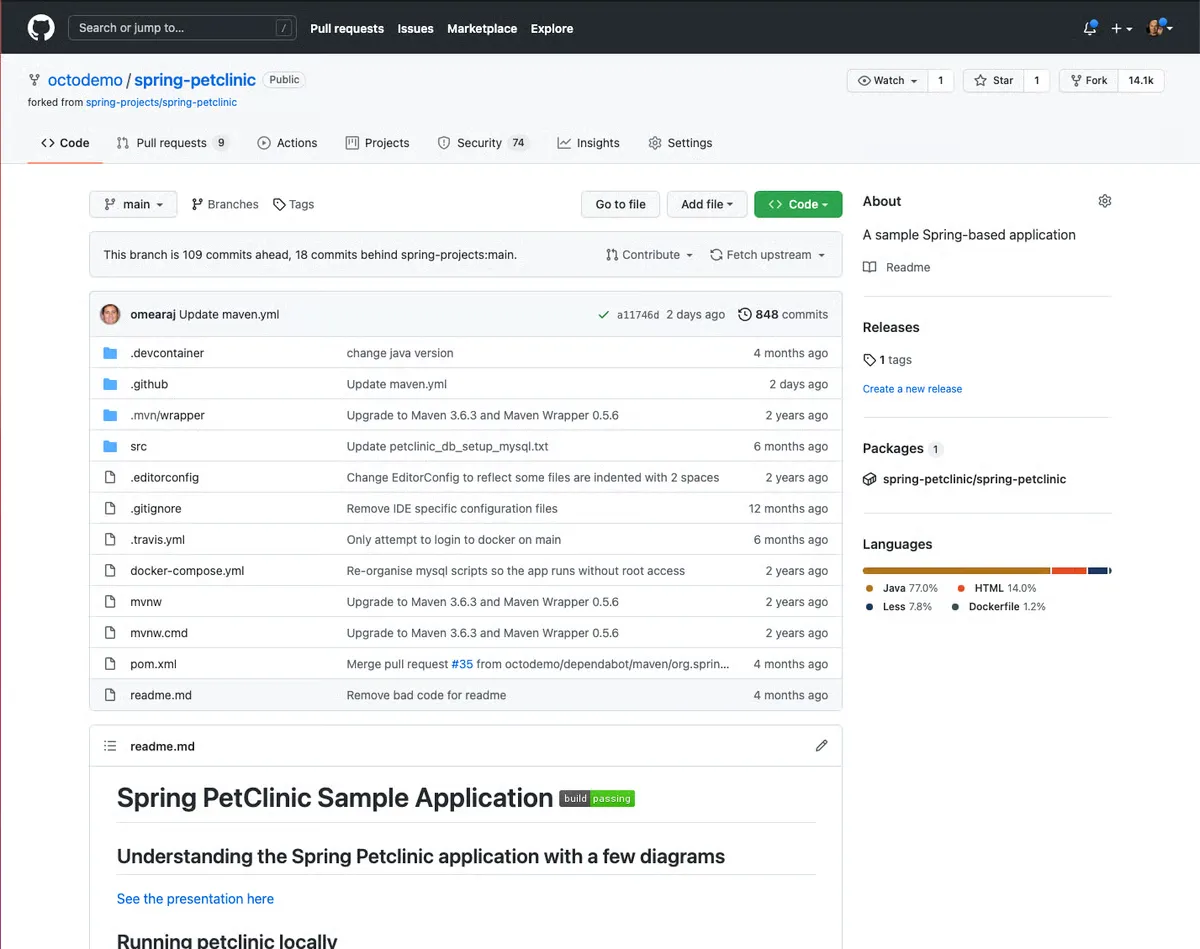
Benefits and Features
- Built-in CI/CD pipeline that is part of the GitHub code hosting platform
- Easy to use and set up
- Supports a wide range of programming languages and deployment platforms
- Offers a variety of features to help you automate your deployment process, including build pipelines, deployment templates, and approvals
Drawbacks
- Complex Setup: Configuring builds and understanding hidden settings can be confusing.
- Beginner Unfriendly: Users without Git experience may find the tool difficult to use at first.
- Performance Issues: Large binary files and media content can slow down workflows.
- Cost for Private Repos: Private repositories with advanced features require a paid plan.
- Documentation Dependence: Users often need to read through detailed docs to resolve issues.
- Internet Access Required: A stable internet connection is needed at all times to use the platform.
- Limited Visual Tools: It lacks a more visual or guided way to build and manage pipelines.
- Debugging Complexity: Troubleshooting failed workflows can take time due to minimal error guidance.
Pricing
Free for public repositories. Private repositories are billed by the minute
Customer ratings:
G2 reviews: 2199, G2 rating: 4.7
Capterra reviews: 6150, Capterra rating: 4.8
Features Valued by Users on Capterra or G2
- Workflow Automation: Defines deployment workflows via YAML files.
- Multi-Environment Deployment: Deploys to cloud, Kubernetes, or servers.
- Integration Capabilities: Connects with GitHub, AWS, and Docker.
- Real-Time Monitoring: Tracks workflow execution in real time.
- Alerts/Notification Systems: Sends notifications for workflow events.
- Scalability: Supports projects of all sizes, from open-source to enterprise.
- User-Friendly Interface: Simplifies setup with pre-built actions marketplace.
- Parallel Workflow Execution: Runs multiple workflows concurrently.
- Action Reusability: Offers reusable actions for streamlined deployment.
12. Argo CD
Argo CD is a Kubernetes-native continuous deployment (CD) tool built for managing GitOps workflows. It connects directly to Git repositories and continuously monitors for changes. When updates are detected, Argo CD automatically syncs the changes to Kubernetes clusters. This pull-based deployment model ensures consistency between declared Git state and live environments.
Argo CD allows teams to manage both application updates and infrastructure configuration in one place. It supports declarative configurations and provides a clear audit trail through version control. Developers can view deployment history, rollback changes, and manage multiple environments with ease. It integrates well with other CNCF tools and Kubernetes-native services. Argo CD also offers role-based access control and integrates with SSO providers. It’s especially useful for managing microservices and large-scale environments with multiple clusters and applications.
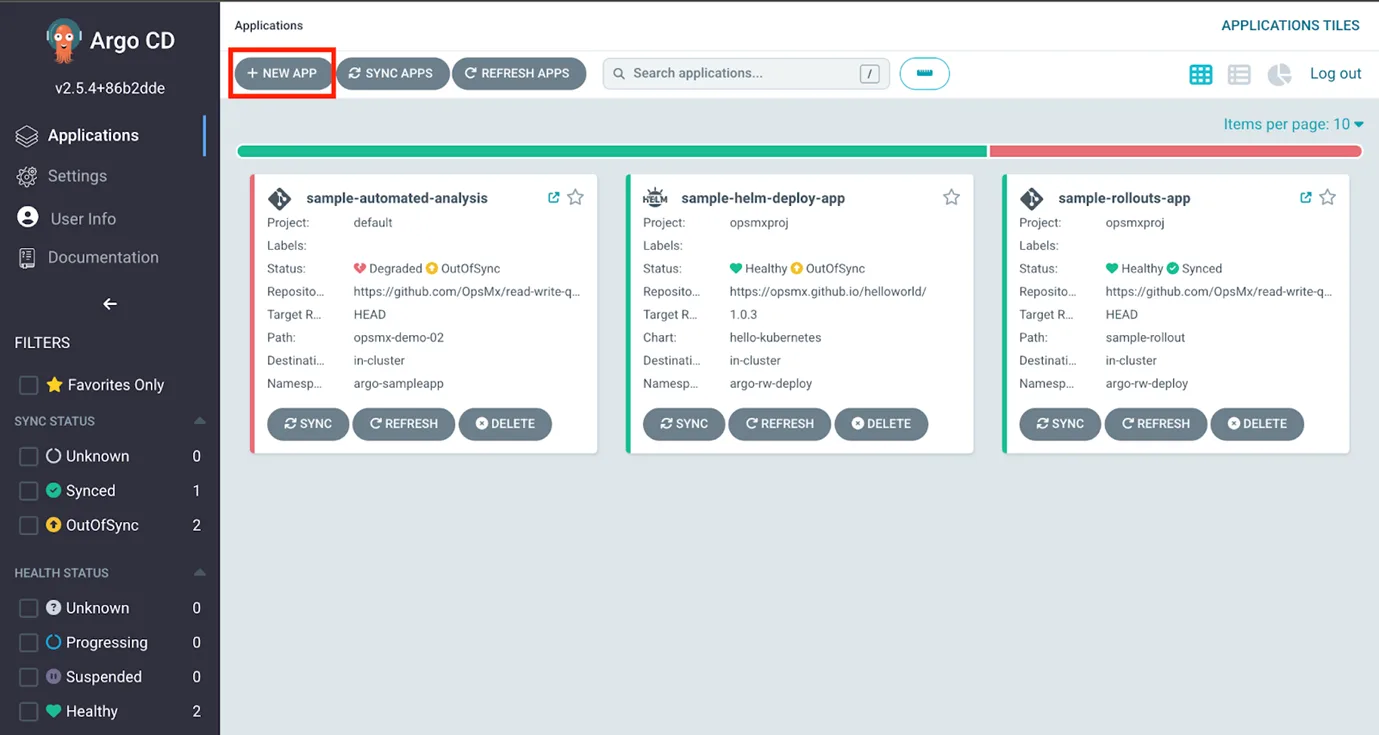
Benefits and Features
- Offers both a web UI and command-line interface (CLI) for flexible access
- Supports manual and automatic syncing of application state
- Enables faster and more consistent deployments across environments
- Built-in role-based access control (RBAC) for secure team collaboration
- Supports single sign-on (SSO) with providers like GitHub, GitLab, and OAuth2
- Compatible with major Git platforms, including GitHub, Bitbucket, and GitLab
- Scales well for multi-cluster and multi-application environments
Drawbacks
- Steep Learning Curve: New users unfamiliar with Kubernetes or GitOps may find it hard to get started.
- Complex Setup: Some features require CLI use, as they are not available in the web UI.
- Slow Syncing: Application syncing can be delayed, affecting deployment speed.
- Unclear Errors: Error messages are often vague, making troubleshooting difficult.
- Limited Documentation: Advanced use cases are not well-covered in the official guides.
- Beta Features: Support for multiple Git repositories in Helm charts is still in beta.
- Cluster Limitations: Managing multiple clusters is restricted and lacks flexibility.
- Poor ApplicationSet Usability: Developers and testers with less infrastructure experience may struggle to use ApplicationSets.
Pricing
Argo CD offers pricing upon request.
Customer ratings:
G2 reviews: 31, G2 rating: 4.5
Features Valued by Users on Capterra or G2
- GitOps Deployment: Synchronizes Kubernetes clusters with Git repositories.
- Multi-Cluster Deployment: Manages deployments across multiple Kubernetes clusters.
- Integration Capabilities: Works with Helm, Kustomize, and Git.
- Real-Time Monitoring: Tracks application sync status and health.
- Alerts/Notification Systems: Notifies via Slack or webhooks for sync issues.
- Scalability: Scales for large Kubernetes-based deployments.
- Declarative Configuration: Uses YAML for reproducible deployments.
- Parallel Sync Execution: Synchronizes multiple applications concurrently.
- Rollback Support: Reverts to previous Git commits for failed deployments.
13. Puppet

Puppet is a configuration management and automation tool. It ensures systems are consistently configured across various environments. Puppet uses a declarative approach to automate provisioning and configuration enforcement. It works for on-premise, cloud, and hybrid infrastructures.
Puppet centralizes system management and simplifies the configuration process. It can be used for software deployment and server orchestration. Puppet manages both Linux and Windows system configurations. It is written in Ruby and uses a Domain Specific Language (DSL) to define system configurations. Puppet helps maintain system consistency and improve security. It streamlines infrastructure management and enables smooth operations. Puppet is ideal for large-scale environments where automation and configuration management are key.
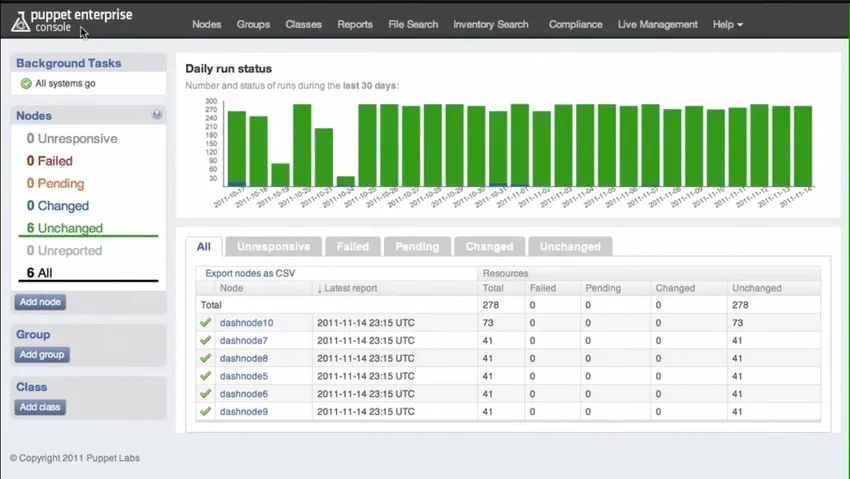
Benefits and Features
- Automates system configuration and provisioning through infrastructure-as-code.
- Manages large-scale infrastructures across multiple environments with ease.
- Supports version control, peer review, automated testing, and deployment.
- Ensures consistent and predictable system configurations across the environment.
- Detects and resolves issues, leading to reduced downtime and faster recovery.
- Supports platforms like Windows, BSD, and Debian without new scripting requirements.
- Easily integrates with cloud platforms, CI/CD tools, and other DevOps tools.
Drawbacks
- Unnatural Language: Puppet's language can feel awkward and difficult to grasp.
- Scaling Challenges: Scaling Puppet requires learning custom methods and restructuring the initial setup.
- Tedious Setup: The setup process for Puppet, including Puppet Master and PuppetDB, is time-consuming.
- Learning Curve: The declarative language requires time and effort to understand fully.
- Complex Infrastructure Setup: Initial infrastructure setup is labor-intensive, although it functions well afterward.
Pricing
Puppet offers a free plan for small teams and custom pricing for commercial, enterprise, and advanced plans—pricing available upon request.
Customer ratings:
G2 reviews: 43, G2 rating: 4.2
Capterra reviews: 24, Capterra rating: 4.4
Features Valued by Users on Capterra or G2
- Infrastructure as Code (IaC): Defines system configurations with Puppet code.
- Multi-Environment Deployment: Automates deployments across data centers and clouds.
- Integration Capabilities: Works with Jenkins, AWS, and Kubernetes.
- Real-Time Monitoring: Tracks system compliance and configuration status.
- Alerts/Notification Systems: Notifies for configuration drift or failures.
- Scalability: Manages large-scale infrastructure with ease.
- Desired State Enforcement: Ensures systems remain in configured states.
- Parallel Task Execution: Applies configurations to multiple nodes concurrently.
- Compliance Management: Supports regulatory compliance with audits.
- Parallel Deployment Execution: Deploys to multiple targets concurrently.
- Deployment History: Maintains logs for auditing and troubleshooting.
14. Chef

Chef is an open-source automation platform for managing infrastructure as code. It helps DevOps teams automate server setup, configuration, and deployment across on-premises and cloud environments.
Chef uses a declarative approach to define system states through code, ensuring consistency and reducing manual errors. Developers install the Chef Development Kit (Chef DK) on their workstation to write and test configuration scripts. These scripts, called cookbooks and recipes, are uploaded to the Chef Server, which distributes them to managed nodes.
Chef supports a wide range of platforms, including Linux, Windows, containers, and cloud VMs. It allows teams to manage everything from servers to network devices in one place. Chef is designed to promote collaboration between developers and IT operations. Its flexibility and scalability make it suitable for both small and enterprise environments.
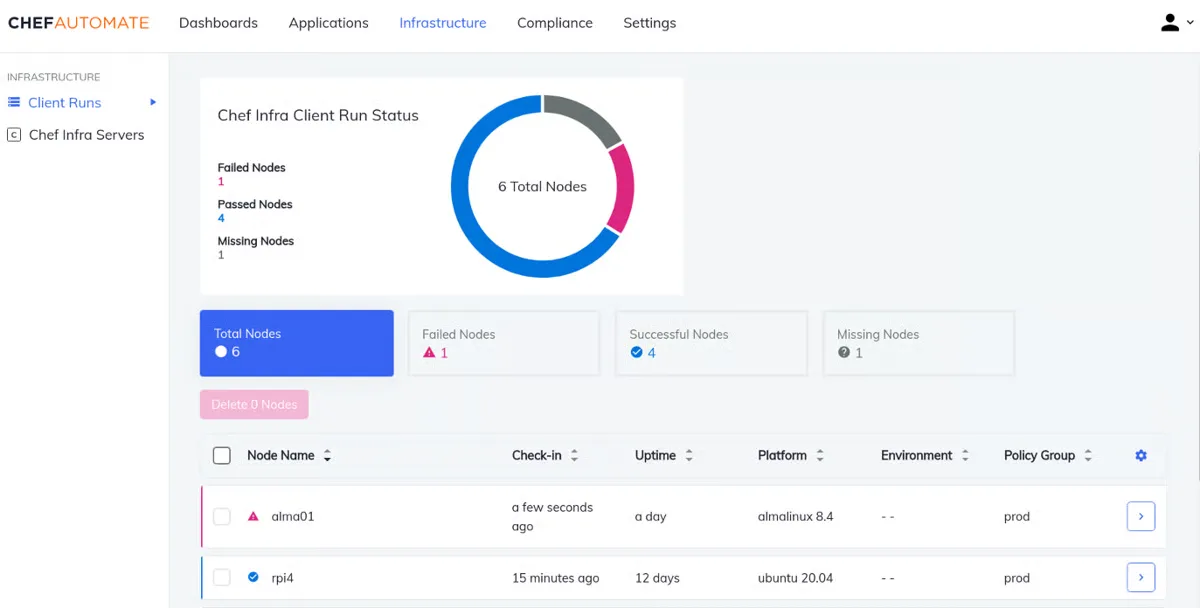
Benefits and Features
- Automates infrastructure configuration, deployment, and management across cloud and edge environments
- Supports a wide range of platforms, including Linux, Windows, containers, and cloud VMs
- Provides tools to ensure infrastructure security and compliance at scale
- Helps enforce policies and perform audits with push-button compliance capabilities
- Enables consistent, repeatable deployments using code (cookbooks and recipes)
Drawbacks
- Steep Learning Curve: New users may struggle to learn the syntax and workflow.
- Complex Setup: Installing and configuring Chef infrastructure can be difficult.
- Limited Documentation: Real-world examples and advanced use cases are not well-covered.
- Poor Community Support: Users often find the support community unresponsive or lacking depth.
- High Testing Effort: Setting up environments for cookbook testing requires extra time and resources.
- No Managed Service: Users must handle infrastructure, as managed options are not available.
- Development Overhead: Writing and testing cookbooks can be more involved than with simpler tools.
- Inconsistent Support: Official support and troubleshooting resources are sometimes unreliable.
Customer ratings:
G2 reviews: 105, G2 rating: 4.2
Features Valued by Users on Capterra or G2
- Multi-Environment Deployment: Deploys across cloud, hybrid, and on-premises.
- Integration Capabilities: Works with Jenkins, AWS, and Docker.
- Real-Time Monitoring: Tracks system configurations and compliance.
- Alerts/Notification Systems: Notifies for configuration errors or drift.
- Scalability: Supports large-scale infrastructure management.
- Compliance Management: Ensures systems meet regulatory standards.
- Parallel Task Execution: Applies configurations to multiple nodes concurrently.
- Versionable Infrastructure: Treats infrastructure as testable, repeatable code.
Top Automated Deployment Tools Selection Criteria and Methodology
The process of selecting the automated deployment tools featured in this guide involved a comprehensive evaluation based on multiple criteria. Our goal was to provide a diverse selection that addresses various deployment needs, from CI/CD pipelines to infrastructure automation. The following factors played a crucial role in the selection process:
CI/CD Pipeline and Deployment Support
The selected tools were evaluated for their ability to automate software deployment processes, including continuous integration, continuous deployment, and release management, based on customer testimonials and documented use cases. Priority was given to tools that support diverse deployment environments (e.g., cloud, on-premises, hybrid, Kubernetes).
Popularity and Community Support
Tools with a strong user community and widespread adoption were prioritized to ensure reliability and ongoing support.
- They had to have received evaluations from at least 30 satisfied users across various review platforms, such as g2.com, Capterra, TrustRadius (all tools had over 30 total reviews).
- They had to have a total Capterra or G2 rating of 4 or better.
- They could not have any completely negative reviews (i.e., reviews indicating critical failures or unusable features).
Features and Functionality
We assessed the breadth and depth of features offered by each deployment tool. Preference was given to tools with robust capabilities, such as:
- Automated build, test, and deployment pipelines.
- Support for advanced deployment strategies (e.g., blue-green, canary, rolling updates).
- Infrastructure as Code (IaC) and configuration management.
- Rollback mechanisms and deployment monitoring.
Tools offering the widest range of deployment-related features were highlighted.
User-Friendly Interface
We carefully analyzed user reviews to determine the user-friendliness of each automated deployment tool. Tools with intuitive interfaces, clear documentation, and streamlined workflows for setting up and managing deployments were prioritized to ensure accessibility for both novice and experienced DevOps teams.
Scalability
The ability of the tools to support both small-scale projects and large, enterprise-level deployments was evaluated. This metric was analyzed based on the “Company Size” information available on the G2 platform, ensuring tools could scale from startups to large organizations with complex deployment needs.
Integration Capabilities
Tools that seamlessly integrate with popular development, version control, and DevOps ecosystems were favored. Key integrations included:
- Version control systems (e.g., GitHub, GitLab, Bitbucket).
- Cloud platforms (e.g., AWS, Azure, GCP).
- Containerization and orchestration tools (e.g., Docker, Kubernetes).
- CI/CD and monitoring tools (e.g., Jenkins, Prometheus).
Strong integration capabilities were critical for ensuring compatibility with modern DevOps workflows.
Advancements and Updates
Tools with active development, regular updates, and a commitment to staying current with industry trends (e.g., GitOps, cloud-native deployments, AI-driven automation) were prioritized. This ensured the tools remain relevant in the rapidly evolving DevOps landscape.
The combination of these criteria led to the selection of the automated deployment tools featured in this guide. There was no sponsorship involved in this process, and the tools were thoroughly investigated by real people, not algorithms, to ensure an unbiased and practical evaluation.






